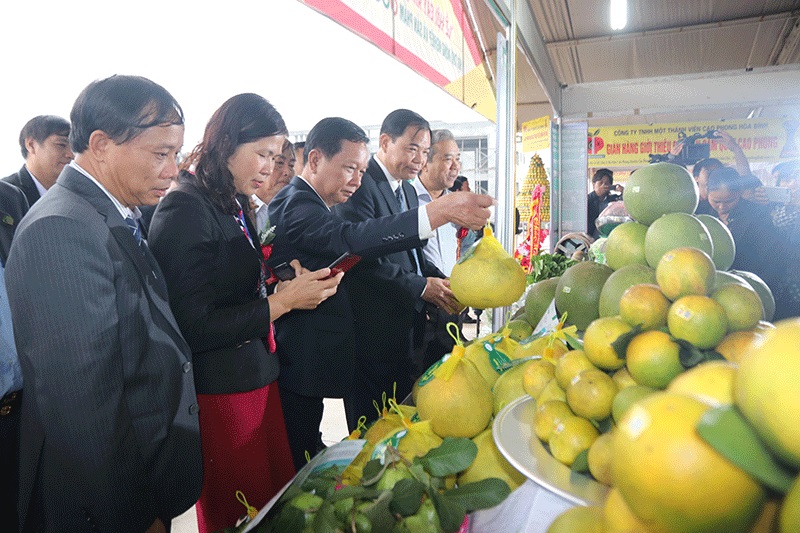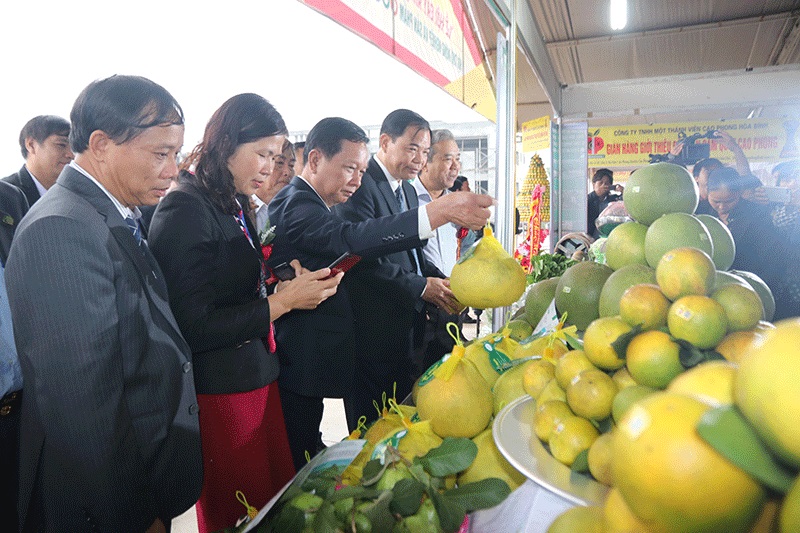
(HBO) – The Ministry of Agriculture and Rural Development and the Hoa Binh People’s Committee co-held a fair on agriculture and products under the "One Commune One Product (OCOP) programme in the North and the Hoa Binh province Citrus Fruit Festival on November 1 – 5.
Hoa Binh currently farms about 10,500 hectares of citrus fruits of various species, ranging from orange, tangerine to pomelo. The citrus fruit areas produce more than 150,000 tonnes of fruits annually that generate 450 million – 500 million VND per hectare. This has raised the average value of agricultural land to 135 million VND per hectare and contributed to the 6.2-percent agricultural growth in the province this year.
As part of the OCOP programme, Hoa Binh has recognised eight products as four-star class, 16 others three-star which are among the northern provinces’ 400 OCOP products. This has helped promote specialty products of each province among both domestic and foreign consumers.
The events featured nearly 200 exhibitors who displayed about 4,000 products at 300 booths. They provided an opportunity to advertise citrus fruits, OCOP and agricultural products from Hoa Binh and other northern provinces among the consumers.
It also aimed to raise the sense of responsibility among farmers and producers in agricultural production and distribution and urge them to improve the products’ added value and safety, sustainably develop and adapt to climate change, contributing to the building of new-style rural areas and raising rural living standards.
At the events’ opening ceremony, the provincial People’s Committee presented OCOP-standard certificates to eight four-star products, including Mai Chau brocades, Ha Phong fresh orange and orange juice, Inchi sachi tea, Lac Thuy chickens, Da River tilapia and Bagridae fishes, and Pa Co Shan Tuyet tea, alongside 16 three-star products.
Leaders of the province also launched a portal for tracking origin of local agricultural, forestry and fishery products – hb.check.net.vn./.
According to data from the Hoa Binh Provincial Party Committee, the industrial production index for the first six months of 2025 is estimated to have increased by 20% compared to the same period last year. This marks the highest year-on-year growth rate for this period since 2020.
In the first six months of 2025, Hoa Binh province’s export turnover was estimated at 1.145 billion USD, marking an 18.11% increase compared to the same period in 2024. Import turnover was estimated at $ 804 million, a 17.15% increase, which helped the province maintain a positive trade balance.
The lives of the ethnic minority farmers in Tan Lac district have gradually improved thanks to the new directions in agricultural production. This is a testament to the collective strength fostered through the professional associations and groups implemented by various levels of the district’s Farmers’ Union.
With the motto the "product quality comes first,” after nearly one year of establishment and operation, Muong village’s Clean Food Agricultural and Commercial Cooperative, located in Cau Hamlet, Hung Son Commune (Kim Boi district), has launched reputable, high-quality agricultural products to the market that are well-received by consumers. The products such as Muong village’s pork sausage, salt-cured chicken, and salt-cured pork hocks have gradually carved out a place in the market and they are on the path to obtaining the OCOP certification.
In the past, the phrase "bumper harvest, rock-bottom prices" was a familiar refrain for Vietnamese farmers engaged in fragmented, small-scale agriculture. But today, a new spirit is emerging across rural areas of Hoa Binh province - one of collaboration, organisation, and collective economic models that provide a stable foundation for production.
Maintaining growing area codes and packing facility codes in accordance with regulations is a mandatory requirement for agricultural products to be eligible for export. Recently, the Department of Agriculture and Environment of Hoa Binh province has intensified technical supervision of designated farming areas and packing facilities to safeguard the "green passport" that enables its products to access international markets.



